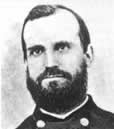 Open main menu
Open main menu
 Open main menu
Open main menu

A. J. Warner
(1834 - 1910)
Home State: Pennsylvania
Education: New York Central College
Command Billet: Commanding Regiment
Branch of Service: Infantry
Unit: 10th Pennsylvania Reserves
see his Battle Report
Before Antietam
After graduating from college, he was principal of the Lewistown (PA) Academy, superintendent of the public schools of Mifflin County, and principal of Mercer Union School, 1856-1861. At the outset of the War he was commissioned Captain in the Tenth Pennsylvania Reserves to date from 21 July 1861. He was promoted to Lieutenant Colonel of the Regiment on 14 May 1862.
On the Campaign
He led the regiment in action on South mountain on 14 September 1862,
but it was at Antietam [on 17 September] that he gave the most signal proof of his ability as a soldier. As the battle opened he was ordered by General Hooker to proceed to the extreme right of the line, and as far to the front as he could, and report the movements of the enemy. As he went forward he discovered heavy masses of the foe pushing out upon that part of the field where Hooker was already most heavily engaged ... 'I immediately,' he says in his report, 'threw out nearly the whole regiment into a corn-field, as skirmishers ... For about twenty minutes the skirmishing was kept up sharply, and the enemy's whole force was held at bay.'He did not seem badly hurt and was able to get off his horse unaided.
But Colonel Warner, while doing bravely and well for his country, was himself sorely scourged. After having his horse twice struck, his sword once, one ball graze his right side and another pass through his coat, he was hit by a Minie ball in the right hip, which shattered the pelvis bone and buried itself.
The rest of the War
Surgeons could not initially find the bullet and he received only superficial treatment, with poor results, until he underwent more serious surgery on 6 February 1863, during which surgeons found and removed the bullet. He had largely recovered and returned to his regiment by July.
He had been appointed Colonel of the 10th Reserves on 25 April 1863, but was further injured in a fall at Gettysburg, PA in July. He was appointed Colonel of the 17th Regiment, Veteran Reserve Corps on 15 November 1863. By 1864 he was judged physically unfit for active service, and served on court-martial duty, and took command of the post at Indianapolis, IN.
After the War
He was honored by brevet to Brigadier General, US Volunteeers to dat from 13 March 1865 for his war service. He studied law and was admitted to the bar in Indianapolis, IN but did not practice. He briefly returned to Pennsylvania but moved to Marietta, OH in 1866 and was in the oil, coal, and railroad businesses. He published "Appreciation of Money" (Philadelphia, 1877), "Source of Value in Money" (1882), and other works on economics and was a leader in the "Free Silver" movement.
He was elected as a Democrat to the Forty-sixth Congress (4 March 1879 - 3 March 1881), failed reelection in 1880, and was elected to the Forty-eighth and Forty-ninth Congresses (1883 - 1887). He did not run again. In 1896 he was a delegate to the Democratic National Convention, later was in trolley construction in Washington DC, and built railroads in Ohio. Between about 1898 and his death he developed transportation and power in Georgia.
References & notes
His service basics and the campaign quote above from Bates. His picture from Uriguen,2 of unknown provenance. Personal details from the US Congress3 and Appleton's.4 Antietam wound and hospital details from the MSHWR.5
He was the subject of The Ordeal of Adoniram Judson Warner: His Minutes of South Mountain and Antietam, an article by James B. Casey in Civil War History magazine (September l982, pp. 213-36).
Birth
1/13/1834; Wales, NY
Death
8/12/1910; Marietta, OH; burial in Oak Grove Cemetery, Marietta, OH
1 Bates dramatizes LCol Warner's words somewhat (see the text of his report).
Bates, Samuel Penniman, Martial Deeds Of Pennsylvania, Philadelphia: T. H. Davis & Co., 1876, pp. 886-887 [AotW citation 74]
2 Uriguen, Mikel, Photo Gallery (Generals and Brevet Generals), Generals of the Civil War, Published c. 1998, first accessed 01 January 1998, <http://www.generalsandbrevets.com/>, Source page: brevets, "W", pg. 2 [AotW citation 71]
3 US Congress, Congressional Biographical Directory, Published c. 2000, first accessed 01 January 2002, <https://bioguide.congress.gov/>, Source page: scripts/guidedisplay.pl?index=W000151 [AotW citation 72]
4 Fiske, John, and James Grant Wilson, editors, Appleton's Cyclopedia of American Biography, 6 vols., New York City: D. Appleton and Company, 1887-1889, Vol. 6, pg. 359 [AotW citation 73]
5 Barnes, Joseph K., and US Army, Office of the Surgeon General, The Medical and Surgical History of the War of the Rebellion, 6 books, Washington DC: US Government Printing Office, 1870-1883, Volume 2, Part 2, p. 232 [AotW citation 32049]